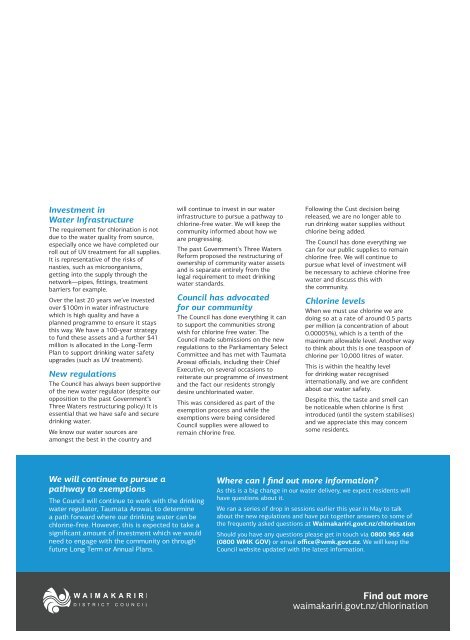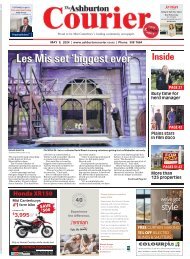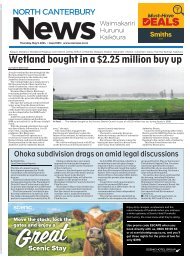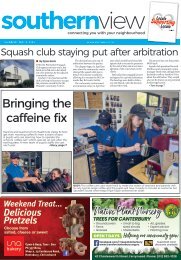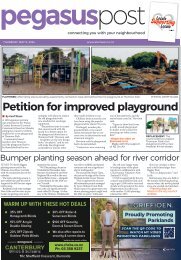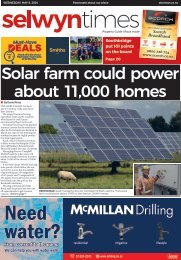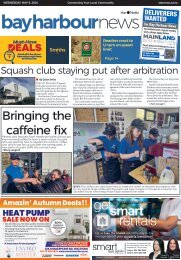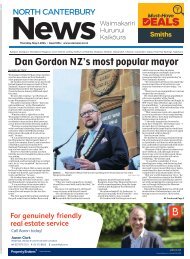Create successful ePaper yourself
Turn your PDF publications into a flip-book with our unique Google optimized e-Paper software.
Investment in<br />
Water Infrastructure<br />
The requirement for chlorination isnot<br />
due tothe water quality from source,<br />
especially once wehave completed our<br />
roll out ofUVtreatment for all supplies.<br />
It is representative of the risks of<br />
nasties, such as microorganisms,<br />
getting into the supply through the<br />
network—pipes, fittings, treatment<br />
barriers for example.<br />
Over the last 20years we’ve invested<br />
over $100m in water infrastructure<br />
which is high quality and have a<br />
planned programme toensure itstays<br />
this way. Wehave a100-year strategy<br />
to fund these assets and afurther $41<br />
million isallocated in the Long-Term<br />
Plan to support drinking water safety<br />
upgrades (such as UV treatment).<br />
New regulations<br />
The Council has always been supportive<br />
of the new water regulator (despite our<br />
opposition to the past Government’s<br />
Three Waters restructuring policy) It is<br />
essential that wehave safe and secure<br />
drinking water.<br />
We know our water sources are<br />
amongst the best in the country and<br />
will continue to invest in our water<br />
infrastructure topursue apathway to<br />
chlorine-free water. We will keep the<br />
community informed about how we<br />
are progressing.<br />
The past Government’s Three Waters<br />
Reform proposed the restructuring of<br />
ownership ofcommunity water assets<br />
and is separate entirely from the<br />
legal requirement to meet drinking<br />
water standards.<br />
Council has advocated<br />
for our community<br />
The Council has done everything it can<br />
to support the communities strong<br />
wish for chlorine free water. The<br />
Council made submissions on the new<br />
regulations to the Parliamentary Select<br />
Committee and has met with Taumata<br />
Arowai officials, including their Chief<br />
Executive, on several occasions to<br />
reiterate our programme of investment<br />
and the fact our residents strongly<br />
desire unchlorinated water.<br />
This was considered as part of the<br />
exemption process and while the<br />
exemptions were being considered<br />
Council supplies were allowed to<br />
remain chlorine free.<br />
Following the Cust decision being<br />
released, weare no longer able to<br />
run drinking water supplies without<br />
chlorine being added.<br />
The Council has done everything we<br />
can for our public supplies to remain<br />
chlorine free. We will continue to<br />
pursue what level ofinvestment will<br />
be necessary to achieve chlorine free<br />
water and discuss this with<br />
the community.<br />
Chlorine levels<br />
When we must use chlorine weare<br />
doing soatarate ofaround 0.5 parts<br />
per million (a concentration of about<br />
0.00005%), which is atenth ofthe<br />
maximum allowable level. Another way<br />
to think about this is one teaspoon of<br />
chlorine per 10,000 litres of water.<br />
This is within the healthy level<br />
for drinking water recognised<br />
internationally, and weare confident<br />
about our water safety.<br />
Despite this, the taste and smell can<br />
be noticeable when chlorine isfirst<br />
introduced (until the system stabilises)<br />
and weappreciate this may concern<br />
some residents.<br />
We will continue topursue a<br />
pathway to exemptions<br />
The Council will continue to work with the drinking<br />
water regulator, Taumata Arowai, to determine<br />
apath forward where our drinking water can be<br />
chlorine-free. However, this is expected to take a<br />
significant amount ofinvestment which wewould<br />
need to engage with the community on through<br />
future Long Term or Annual Plans.<br />
Where can Ifind out more information?<br />
As this is abig change in our water delivery, weexpect residents will<br />
have questions about it.<br />
We ran aseries ofdrop insessions earlier this year in May totalk<br />
about the new regulations and have put together answers tosome of<br />
the frequently asked questions at Waimakariri.govt.nz/chlorination<br />
Should you have any questions please get in touch via 0800 965 468<br />
(0800 WMK GOV) or email office@wmk.govt.nz. Wewill keep the<br />
Council website updated with the latest information.<br />
Find out more<br />
waimakariri.govt.nz/chlorination


